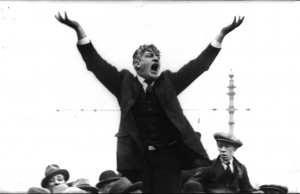Jim Larkin – Messenger of Peace
Some interesting correspondence surrounding Jim Larkin’s release from Sing Sing prison in New York state, where he was serving five years for sedition, has been found in the National Archives. It is between the British Consulate General in the US and the new Free State government in 1923 as the Civil War was drawing to a close. Larkin was given an unconditional pardon by the Democratic Governor of New York, Al Smith on January 17th, 1923, just over a fortnight after Smith’s inauguration and this reflected the widespread public belief in the US that the legendary Labour leader had been unjustly convicted.
Larkin had denounced the Treaty from prison and the British authorities were concerned that he would return to Ireland and throw his still considerable influence behind the republican cause in Ireland. The Consulate General’s office reported him as appealing at an ‘Irish’ meeting in Boston for ‘volunteers to fight against the present Irish government, along with money which would be used to buy supplies for “relief work”’. The same report said de Valera attended the meeting, which does somewhat undermine its credibility, given that ‘Dev’ was still on the run in Ireland.
Ironically Larkin arrived in Ireland just five hours after the unilateral ceasefire by the Republican forces on April 30th, 1923. On his return Larkin spoke out strongly and consistently in favour of peace, much to the chagrin of many Republicans. He said that the questions of the day should be decided ‘with reason and logic, for the sword, the bayonet and the rifle never proved to be anything but brutality. Force meant that might was right’.
For more information go to http://www.thejournal.ie/james-larkin-deportation-1923-710632-Dec2012/
Our thanks to Cedar Loung Revolution for drawing our attention to this.
We hope to announce a Programme of Events for the Lockout Centenary on January 30th, the anniversary of Jim Larkin’s death, when our website will be relaunched as well

This iconic picture has become associated with 1913 and the Lockout but it was taken in 1923 at one of the meetings where Larkin was urging an end to fratricidal strife
